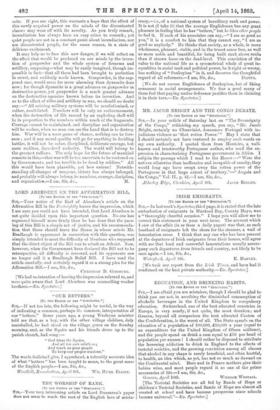THE WORSHIP OF RANK.
ITO THE EDITOR OF THE "SPECTATOR."]
Sra,—Your very interesting article on Lord Dunraven's paper does not seem to reach the root of the English love of aristo- cracy,—i.e., of a national system of hereditary rank and power. It is not (I take it) that the average Englishman has any great. pleasure in feeling that he has "betters," but he likes other people to feel it. If each of his associates can say,—" I am as good as you," it is a comfort to him that they cannot say, "I am as good as anybody." He thinks that society, as a whole, is more wholesome, pleasant, stable, and in the truest sense free, as well as more noble and beautiful, for being built rank above ranks than if strewn loose on the dead-level. This conviction of the value to the national life as a symmetrical whole of great in- equalities in social rank and political power, be it right or wrong,. has nothing of " flunkeyism " in it, and deserves the thoughtful regard of all reformers.—I am, Sir, &c., Dioxus.
[We do not accuse Englishmen of flunkeyism, but of liking ornament in social arrangements. We fear a good many of them feel that paying undue deference justifies them in claiming. it in their turn.—En. Spectator.]


































 Previous page
Previous page